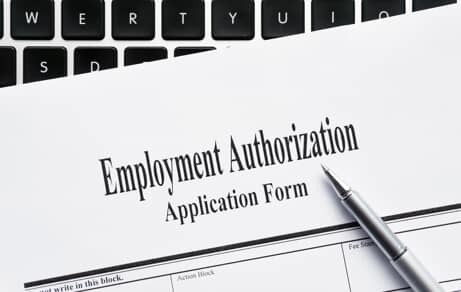On January 13, 2025, a significant change in employment authorization processing will take effect, offering relief to both employers and eligible noncitizens. The Department of Homeland Security (DHS) has announced a permanent rule increase to the automatic extension period for certain Employment Authorization Document (EAD) renewal applicants. This update expands the extension period from 180 days to 540 days, streamlining employment continuity and fostering economic stability. Welcome news for immigrants and businesses alike, this policy reflects ongoing efforts to reduce administrative barriers and address critical workforce needs.
This post will explore how this final rule impacts immigrants, employers, and the broader U.S. economy while answering common questions regarding its implementation.
Understanding Employment Authorization Documents (EADs)
An Employment Authorization Document (EAD), also known as an I-766 card, in an employment authorization document issued by the Department of Homeland Security (DHS) to noncitizens who are eligible to work in the United States. This document serves as proof of work authorization and plays a vital role in supporting both individual livelihoods and the labor market.
Renewal applicants often face challenges due to processing delays, which can result in gaps in employment authorization and create uncertainty for employers. The final rule aims to eliminate these barriers, ensuring eligible workers can continue contributing to their workplaces without unnecessary interruptions.
What Does the New Rule Change?
Effective January 13, 2025, the DHS's new rule permanently increases the automatic extension period for certain employment authorization document renewals from 180 days to 540 days. This extension applies to eligible applicants who file a timely renewal request.
This change builds on a temporary measure implemented in May 2022, which addressed significant backlogs and helped maintain employment authorization for thousands of immigrants. By making this policy permanent, DHS aims to provide greater certainty to renewal applicants and their employers while supporting economic growth.
Key Takeaways:
Eligible noncitizens with pending, timely-filed EAD renewal requests will receive up to 540 days of automatic employment authorization.
This rule applies retroactively to eligible EAD applications filed on or after May 4, 2022.
Employers can now retain qualified workers without the risk of lapses in authorization.
The rule streamlines processes, allowing U.S. Citizenship and Immigration Services (USCIS) to manage workloads efficiently.
Immediate Benefits:
Reduced Administrative Bottlenecks: Less stress for applicants awaiting EAD renewals.
Improved Workforce Stability: Ensures continuous employment and prevents layoffs due to administrative delays.
Employer Certainty: Facilitates workforce planning by eliminating disruptive gaps caused by unpredictable renewal processing times.
Supporting U.S. Businesses and the Economy
At a time when the U.S. economy has created over 16 million new jobs since January 2021, ensuring businesses have access to skilled workers is critical. Processing delays for EAD renewals have made it difficult for employers to fill open positions, especially in sectors relying heavily on immigrant labor.
By addressing this issue, the DHS has taken steps to empower businesses and aid local economies. Retaining skilled employees is now easier, reducing hiring disruptions and allowing companies to focus on collaboration and growth.
Additional Efforts to Improve EAD Processing
This final rule is just one part of USCIS's broader strategy to optimize employment authorization processing. Key improvements include:
Reduced EAD processing times: Median processing times for individuals with pending adjustment of status applications have been reduced by 50% since 2021.
Enhanced services for asylum applicants and parolees: EAD processing times for these categories have dropped to a median of 30 days.
Extended validity for specific groups: EAD validity periods for certain applicants have been increased from 2 years to 5 years.
Expanded online accessibility: Refugees, asylum applicants, and parolees can now file EAD applications online, reducing paperwork and expediting processing.
These efforts demonstrate a significant commitment to fostering employment stability and improving service efficiency for applicants and employers.
What This Means for Employers
Employers relying on immigrant workers stand to benefit significantly from this rule change. The 540-day automatic extension ensures minimal disruption to operations and avoids the costly process of hiring and training replacements for previously authorized employees.
How Employers Should Prepare:
Review Policies: Update HR practices to incorporate the 540-day extension for EAD renewals.
Educate Hiring Teams: Ensure relevant teams understand the new rule and its implications.
Stay Updated: Monitor USCIS updates and resources regarding EAD policies.
What Renewal Applicants Need to Know
If you are eligible for an EAD renewal, this rule change can simplify your experience. Here’s what you need to do to take advantage of the automatic extension period:
File Timely Renewal Requests
Ensure your renewal application is submitted before your current authorization expires.
Track Your Application Status
You can monitor the status of your EAD renewal application through USCIS’s online system.
Inform Your Employer
Notify your employer of the automatic extension and provide necessary documentation.
By following these steps, you can maintain your employment authorization without disruptions.
The Bigger Picture
Widening access to employment authorization documents supports not only individual livelihoods but also broader economic growth. This policy underscores the critical role of immigrants in driving the U.S. labor market forward.
With efforts to reduce processing delays and enhance accessibility, the DHS and USCIS are making it clear that they prioritize immigrant workers’ contributions and employers’ operational stability.
Next Steps for Renewal Applicants and Employers
This policy offers much-needed relief for both applicants and businesses. Effective January 2025, eligible individuals and companies can look forward to smoother transitions and more reliable timelines for employment authorization documentation. If you’re navigating the EAD renewal process, ensure you file on time to maximize the benefits of this new policy.
For further details on EAD renewal applications and employment authorization policies, visit the official USCIS website. If you need personalized guidance or have questions about your specific case, contact Panteva Law Group for expert assistance. Stay informed, stay employed, and continue building a stronger U.S. workforce.

